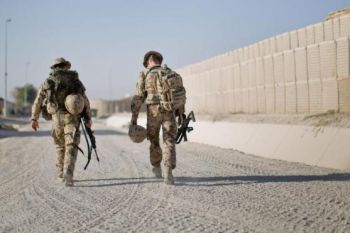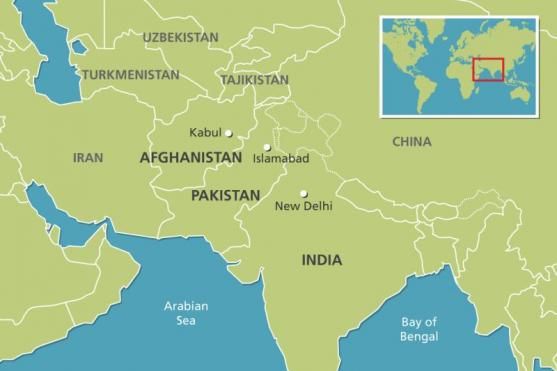
Publisher:
Bonnie King
CONTACT:
Newsroom@Salem-news.com
Advertising:
Adsales@Salem-news.com

~Truth~
~Justice~
~Peace~
TJP
Nov-18-2013 15:39

 TweetFollow @OregonNews
TweetFollow @OregonNews
Nato's Total Withdrawal from Afghanistan Could Rock Asia Stability
Lisa Curtis Special to Salem-News.comTwo years later, Iraq is experiencing a major upsurge in terrorist violence from a revived al-Qaeda.
 Courtesy: World Review |
(HONG KONG World Review) - NATO'S withdrawal from Afghanistan in 2014 is likely to have far-reaching implications for Central and South Asia. And total withdrawal of troops could be devastating for regional security and jeopardise the safety of western nations, say analysts.
The stability of the region is linked directly to the US’s long-term military and economic commitment to Afghanistan after Nato troops are scheduled to leave.
Critical talks are taking place in Afghanistan this week (November 18 – 21, 2013), which will determine whether or not some US and Nato troops remain in the country post 2014.
The Afghan government and some 2,500 tribal elders are discussing a contentious Bilateral Security Agreement (BSA) to allow American and some Nato troops to stay in the country. This includes the US demand that would grant American soldiers immunity from prosecution under Afghan law. If the demands are not met, the US could end up leaving zero forces in Afghanistan, similar to the way it completely pulled out of Iraq in 2011.

Two years later, Iraq is experiencing a major upsurge in terrorist violence from a revived al-Qaeda.
A similar situation in Afghanistan would be devastating for regional security and also jeopardise the safety of western nations as they would face an emboldened network of Islamist terrorists with global ambitions.
Analysts warn that the recent increase in al-Qaeda violence in Iraq should serve as a warning that failure to maintain a residual force in Afghanistan would increase instability throughout South and Central Asia.
If the Taliban were able to re-assert power in Afghanistan, it would embolden militants in Pakistan and increase the risk of extremists gaining access to Islamabad’s nuclear weapons.
An absence of international troops in Afghanistan post-2014 would also leave the door open for the Islamic Movement of Uzbekistan to gain a foothold in northern Afghanistan, from where it could launch operations into Central Asia.
‘We cannot risk allowing the Taliban to retake control of Afghanistan,’ said Ileana Ros-Lehtinen, chair of the US’s House Subcommittee on the Middle East and North Africa, at a congressional hearing in October 2013. ‘This could also lead to al-Qaeda regrouping and stepping up terrorist activities using its safe havens in Pakistan as a staging post, posing a real danger to our national security interests and those of our allies in the region.’
The threat is most acute for Pakistan, a nuclear-armed nation of 180 million, where there is real concern over nuclear weapons falling into the hands of extremists. Pakistan’s nuclear weapons arsenal is one of the fastest growing in the world today. -It has around 100 warheads.
The traditional Loya Jirga (assembly of tribal elders) will meet in Kabul (November 18 – 21) to decide whether to approve the BSA. If the Jirga is in favour and the BSA is finalised, the US and its Nato partners are likely to leave an international force of about 10,000 – 15,000 troops to help fight extremist elements and train and advise the Afghan National Security Forces.
The US decision on the number of troops will be watched closely by Afghanistan’s neighbours as it will determine the extent to which various Islamist extremist groups are able to thrive in Afghanistan and use it as a base from which to export their ideology and violence.
A Taliban victory in Afghanistan would have a blowback effect in Pakistan and embolden terrorist elements there.
There are a variety of terrorist groups based in Pakistan’s tribal areas, including the Haqqani network, Tehrik-e-Taliban Pakistan (TTP), and the Islamic Movement of Uzbekistan (IMU), all of which have links to the Taliban and al-Qaeda.
Fred Kagan, of the US-based think tank the American Enterprise Institute, said at the congressional hearing that an absence of international troops in Afghanistan post-2014 would leave the door open for Haqqani militants to re-establish their bases in eastern Afghanistan and for the IMU to gain a foothold in northern Afghanistan.
There is concern that the IMU would use its base in Afghanistan to launch operations into Central Asian states, particularly Tajikistan and Uzbekistan.
Russia also is concerned that a complete withdrawal of US and Nato forces from Afghanistan could embolden jihadist elements in Afghanistan that would, in turn, export Islamist ideology and violence to the north.
Copyright © 2013 Geopolitical Information Service http://www.worldreview.info
 |
 |
 |
Articles for November 17, 2013 | Articles for November 18, 2013 | Articles for November 19, 2013
Salem-News.com:

Quick Links
DINING
Willamette UniversityGoudy Commons Cafe
Dine on the Queen
Willamette Queen Sternwheeler
MUST SEE SALEM
Oregon Capitol ToursCapitol History Gateway
Willamette River Ride
Willamette Queen Sternwheeler
Historic Home Tours:
Deepwood Museum
The Bush House
Gaiety Hollow Garden
AUCTIONS - APPRAISALS
Auction Masters & AppraisalsCONSTRUCTION SERVICES
Roofing and ContractingSheridan, Ore.
ONLINE SHOPPING
Special Occasion DressesAdvertise with Salem-News
Contact:AdSales@Salem-News.com
googlec507860f6901db00.html


Terms of Service | Privacy Policy
All comments and messages are approved by people and self promotional links or unacceptable comments are denied.
Vic November 19, 2013 8:20 pm (Pacific time)
"Nazi's Total Withdrawal From Poland Could Rock European Stability" Sounds stupid doesnt it ? Same with the title of this piece....
[Return to Top]©2025 Salem-News.com. All opinions expressed in this article are those of the author and do not necessarily reflect those of Salem-News.com.